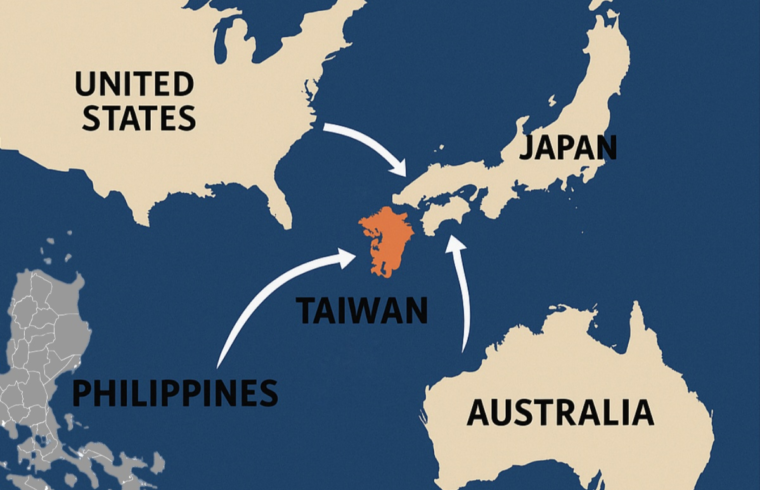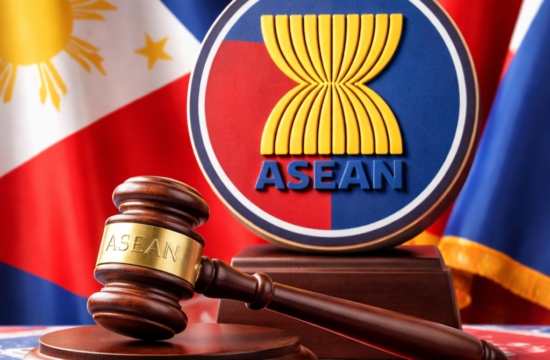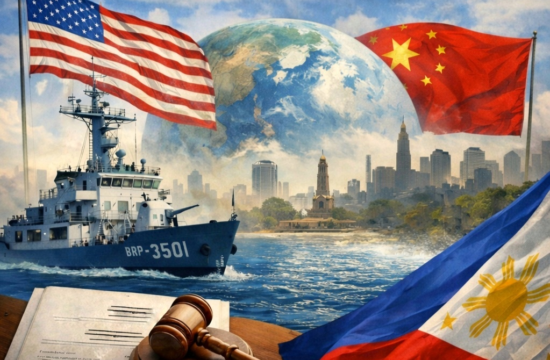If war breaks out in the Taiwan Strait, who stands with whom? Long debated in policy circles and military simulations, this question is no longer theoretical. With tensions escalating across the Indo-Pacific, the prospect of conflict between the United States and China over Taiwan has become an urgent test for regional alliances.
Australia is often assumed to be Washington’s most dependable partner in such a crisis, with Japan and the Philippines frequently named as close behind. This assumption, echoed in recent reports by The Economist and Financial Times, has shaped American expectations of allied support. But beneath the surface of strategic posturing lies a more fragmented reality—one where public opinion, economic exposure, and historical sensitivities complicate the choices facing even Washington’s closest friends.
In Australia, the 2025 Lowy Institute Poll shows that concern over a U.S.–China conflict ranks second only to cyberattacks among perceived national threats. Yet that fear is matched by ambivalence. Just 36% of Australians express trust in the United States to act responsibly, a record low. Trust in Chinese President Xi Jinping has crept up to 20%, and Australians are evenly split—45% each—on whether Xi or U.S. President Donald Trump would be a more reliable partner. These numbers raise questions about how far Australia would go beyond hosting U.S. operations on its soil.
Strategic thinkers in the region have noted this dilemma. Global security expert Zhou Bo, writing for the South China Morning Post (SCMP), argued that Australia’s participation would be constrained by economic self-interest: “Isn’t avoiding war with the country’s largest trading partner more significant to Canberra than buying a few submarines?” he asked, alluding to concerns about the AUKUS submarine deal becoming entangled in broader geopolitical risk.
While Australia is often front and center in American contingency planning, the Philippines has quietly emerged as one of the most strategically critical—and politically complex—players in the region. Geographically situated on the frontlines of any Taiwan scenario, the Philippines has allowed expanded U.S. military access under the Enhanced Defense Cooperation Agreement (EDCA), hosting forward-operating sites from Palawan to northern Luzon. President Ferdinand Marcos Jr. has tilted Manila’s foreign policy decisively back toward Washington, reversing years of hedging under his predecessor.
Yet expert analysis remains skeptical about how deeply Manila would involve itself in actual conflict. Zhou contends that while the Philippines may be tempted to assert its maritime claims if Chinese forces are occupied elsewhere, such a scenario is unlikely and oversimplifies the broader stakes. In his words, “The Philippines would be more cautious,” citing the Centre for a New American Security (CNAS) report, and compared to regional actors with stronger militaries, “it is absurd” to expect opportunistic maneuvers from Manila. The greater risk for the Philippines would be spillover violence and economic disruption—not territorial ambitions.
Public opinion data appears to support this cautious posture, but with a clear preference for siding with Washington. A 2024 Pulse Asia survey showed that 79% of Filipinos favored strengthening ties with the U.S. amid maritime tensions, while only 10% preferred closer relations with China. Additional polling by Oculum Research found that 43% of Filipinos would back the U.S. in any conflict with China, compared to just 3% who would side with Beijing. Trust data is equally telling: more than 75% of Filipinos express high trust in the U.S., while a separate 2024 survey by OCTA found that 91% distrust China, with a majority expressing “no trust at all”.
This sentiment offers the U.S. a degree of confidence in Philippine cooperation—but it does not guarantee full-scale involvement. Memories of colonial occupation, the controversial legacy of U.S. bases, and deep-rooted concerns over sovereignty remain powerful forces in the Philippine political landscape. Support may be real, but it is tempered by risk aversion and domestic pressures.
Elsewhere in the region, support for China in a Taiwan conflict is likely to be minimal. North Korea remains Beijing’s only formal treaty ally, but its reliability is questionable. Russia, despite its growing ties with China, is unlikely to intervene over Taiwan, especially given Beijing’s refusal to back Moscow militarily in Ukraine. And Pakistan, often described as China’s “iron brother,” remains heavily reliant on U.S. aid and investment. Most other Southeast Asian nations—including Vietnam, Malaysia, and Indonesia—are expected to remain neutral, focused more on regional stability than taking sides.
China, for its part, enjoys widespread diplomatic recognition of its “One China” policy. According to SCMP, over 60% of UN member states endorse Beijing’s preferred language on Taiwan, with 89% supporting reunification goals, though few explicitly condone the use of force. This indicates more passive support than active alliance—a signal that Washington may find itself more diplomatically isolated than it assumes.
In the final analysis, the test of loyalty in a Taiwan conflict will not rest on statements or treaties, but on who is willing—and politically able—to act. Australia may offer bases and intelligence, Japan logistical support, and the Philippines key strategic access. But the real dividing line may not be between those who side with Washington or Beijing—it may be between those who move, and those who sit still. Geography, trade, public sentiment, and historical memory will all shape responses. In a crisis where no one wants to fire the first shot, silence may speak louder than allegiance.











